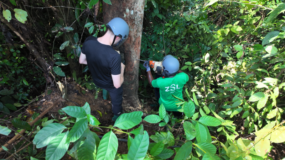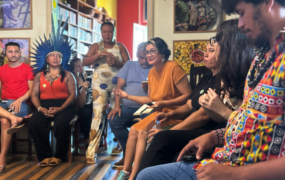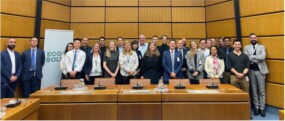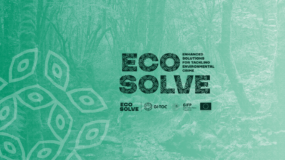Posted on 04 Dec 2024
The illegal wildlife trade is a complex, transnational issue that threatens biodiversity and undermines the rule of law. Addressing wildlife crime requires coordinated international efforts, innovative solutions and robust partnerships across sectors.
To raise awareness about this multifaceted threat, Wildlife Week was launched in November 2024, held in Cape Town, South Africa. A collaboration between the United Nations Office on Drugs and Crime (UNODC), INTERPOL, United for Wildlife and the South African government, the initiative aims to bring together representatives from law enforcement agencies, the judiciary, civil society, academia and the private sector to collaborate on solutions to tackle wildlife crime.
Representatives from more than 35 countries attended Wildlife Week 2024, where three separate multilateral events took place: the 8th UNODC Wildlife Inter-Regional Enforcement (WIRE) Meeting, the United for Wildlife Global Summit and the 35th INTERPOL Wildlife Crime Working Group Meeting. The presentations showcased the potential of collaborative efforts to disrupt wildlife trafficking networks and protect ecosystems around the world.
8th Wildlife Inter-Regional Enforcement Meeting
From 4 to 6 November, the UNODC co-hosted the eighth meeting of the WIRE forum, together with South Africa’s Department of Forestry, Fisheries and the Environment. The WIRE Forum, established in 2016, seeks to provide a platform for represented countries to collaborate on intercepting, investigating and prosecuting wildlife and forestry crimes, thereby strengthening operational exchanges and information sharing in the fight against wildlife crime.


Over the course of the meeting, representatives from 34 countries in Africa, Asia and Latin America explored current and emerging trends in wildlife crime and reviewed successful investigations and collaboration; participated in thematic working groups to promote cooperation between countries, NGOs and the private sector; and engaged with government and law enforcement officials at the bilateral and multilateral levels to focus on unifying strategy and operations to strengthen cooperation against the trafficking of wild fauna and flora.
Key operational advancements from the meeting include:
- developing protocols on data analysis (shipping and financial) and information sharing between the private sector and law enforcement;
- strengthening international cooperation, especially through the use of the UNTOC (UN Convention against Transnational Organized Crime);
- improving international cooperation to aid successful transnational investigations through the support and facilitation of NGOs including intelligence-led investigations and capacity building;
- initiating engagement with civil society on demand reduction for wildlife commodities; and
- expanding analysis to look beyond CITES-listed species.
United for Wildlife Global Summit
The United for Wildlife Global Summit 2024, hosted by the Royal Foundation of the Prince and Princess of Wales from 5 to 7 November 2024, brought together global leaders, conservationists, NGOs, civil society and private sector representatives to develop ideas for collectively disrupting the illegal wildlife trade. The summit emphasized cross-sector collaboration, conservation innovation and the need to empower those on the front lines of protecting wildlife.

- An eye-opening presentation of the World Wide Fund’s Living Planet Index, which showed a 73% decline in monitored wildlife populations over the past 50 years.
- A talk on the implementation of the new Ranger Welfare and Standards Initiative, which provides support to African rangers risking their lives to safeguard biodiversity and emphasizing the need for succession planning.
- Discussion on engaging the finance and transport industries to disrupt illicit wildlife supply chains and combat corruption.
- A call to action by Prince William, who emphasized the urgency of collective efforts, noting, ‘What happens over the next five years is crucial for the future of life on Earth.’
- A global overview of cyber-enabled wildlife crime presented by the Global Initiative Against Transnational Organized Crime (GI-TOC)’s Julian Rademeyer, which showcased turning points in global responses to illegal wildlife trade and environmental crime hotspots, and highlighted the need for strategic, targeted and collaborative efforts to combat the trade
INTERPOL Wildlife Crime Working Group Meeting
INTERPOL held the 35th meeting of its annual Wildlife Crime Working Group from 6 to 8 November 2024. The meeting brought together more than 100 delegates from law enforcement agencies, civil society and academia from across Asia, Oceania, Europe, Africa and the Americas. It aimed to build networks and partnerships to enhance global efforts to combat wildlife crime, discuss new ways of thinking and emerging technologies to support law enforcement in addressing illicit environmental economies, and share results and lessons learned from previous Working Group activities.

Highlights from the three-day event include the following:
- A presentation of INTERPOL’s Global Threat Assessment, which covers 15 crime types and 30 crime trends, including environmental crimes such as illegal wildlife trade.
- Technological innovations such as shipping container air-sampling technology for wildlife detection and webscraper technology that monitors CITES species advertised online in multiple languages.
- Notable case studies, including the first-ever successful controlled delivery between South Africa and Vietnam of a shipment of lion bones, and the prosecution of a severe case of animal cruelty involving monkey torture.
- Collaboration efforts to combat cyber-enabled wildlife crime, with the GI-TOC’s Sal Amato showcasing ECO-SOLVE’s Global Monitoring System, and emphasizing challenges and opportunities in global law enforcement.



